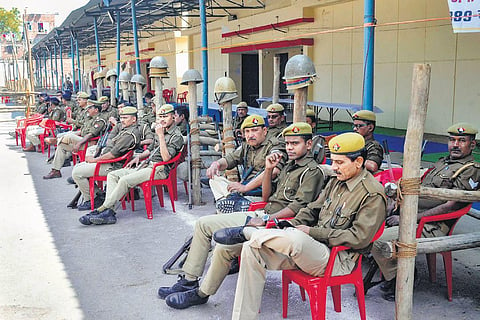

LUCKNOW: The stage is set for the culmination of the electoral battle to win the country’s most populous and politically crucial state of Uttar Pradesh with the counting of votes to 403 constituencies on Thursday.
While the outcome of the 2022 Assembly elections will be in a way a referendum on incumbent chief minister Yogi Adityanath’s performance, for others like the Samajwadi Party (SP), the Bahujan Samaj Party (BSP) and the Congress, it will be a do-or-die battle.
No wonder then that the parties breached all barriers in holding a two-month-long high-octane campaign across 75 districts to woo voters outside the ambit of their clout and respective caste bases. However, the poll panel had imposed restrictions owing to the third wave of the Covid-19 pandemic.
In what was appearing to be a bipolar contest between the ruling BJP and the main opposition Samajwadi Party, the Bahujan Samaj Party relatively remained a silent player on the ground with the limited appearance of party chief Mayawati in the poll arena.
Mayawati has helmed the state for four terms as chief minister. After forming the government thrice in alliance with the BJP, Mayawati came to power with an absolute majority after the 2007 Assembly polls. On the other, Congress, which had been put of power in UP since 1989, succeeded in getting visibility through its extensive campaign this time.
The ruling BJP contested in alliance with its tried and tested partner Apna Dal (S) led by Anupriya Patel, who is a minister in the Modi cabinet, and NISHAD, led by Dr Sanjay Nishad, an MLC coming from the boatmen community among the most backward castes. The BJP fielded candidates on 376 of the total 403 segments leaving 24 seats for the allies.
As for the Samajwadi Party, taking lessons from its back-to-back defeats since 2014, Akhilesh Yadav tried to beat the saffron brigade in its own game this time by stitching a rainbow coalition of seven smaller caste-based parties to do away with the tag of ‘the party of Yadavs and Muslims’.
SP had struck an alliance with Rashtriya Lok Dal (RLD), Mahan Dal, Janwadi Party (Socialist), Apna Dal faction led by Krishna Patel, Suheldev Bhartiya Samaj Party, Shivpal Yadav’s Pragatisheel Samajwadi Party and Gondwana Gantantra Party. BSP and Congress did not have any alliance and fielded candidates on most seats.
The notification for the seven-phase UP elections was issued on January 8 and the voting for 58 seats in the first phase took place on February 10. The second phase for 55 seats took place on February 14 followed by the third phase for 59 seats on February 20, the fourth phase for 61 seats on February 23, the fifth phase for 60 seats on February 27, the sixth phase for 57 seats on March 3 and the last phase of voting for 54 seats on March 7.